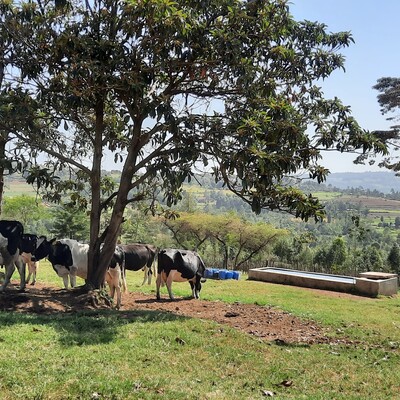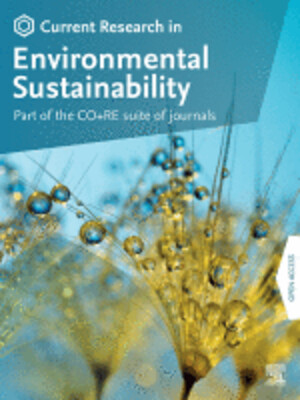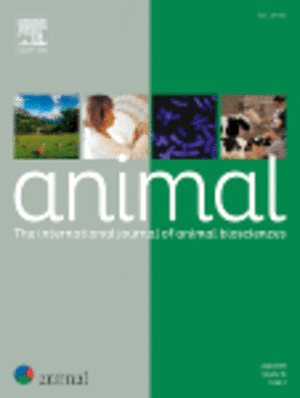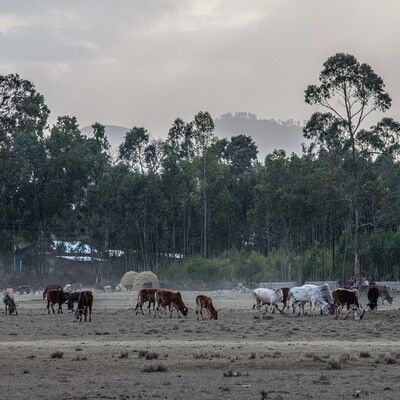
New multi-stakeholder platform to promote strategic approaches in climate-smart agriculture in Kenya
Laura Cramer from ILRI spoke about the process of developing the Kenya climate-smart platform and ILRI's contribution to it. Cramer is a member of the platform's steering committee (photo: ILRI/David Ngome).
One of the biggest challenges in taking effective and sustainable climate action is the lack of linkages between policymaking, climate research and disseminating innovations for adaptation, and mitigation.
To overcome this challenge and create such linkages, the International Livestock Research Institute (ILRI), together with research and development partners, government agencies, private sector players and the government of Kenya have since 2019 been working within a multi-stakeholder platform to promote knowledge sharing, policy development and implementation at the local and county levels.
ILRI has provided research support, innovation, and capacity building for policies that promote climate-smart agriculture at national and county levels. According to the ILRI program leader for Sustainable Livestock Systems Polly Ericksen, research and reliable data on livestock and the impact of climate change are some of the most important factors in formulating strategies and innovations to address the impact of climate change.
'ILRI is committed to ensuring that livestock keepers are included in climate-smart agriculture actions since livestock is an integral part of not only the Kenyan economy but also the food and nutrition security of the Kenya population,' said Polly Ericksen, program leader, ILRI.
A platform, known as the Kenya Climate-Smart Agriculture Multi-Stakeholder Platform (CSA-MSP), will be the bridge for multi-pronged initiatives, innovations, technology, and learnings between the private and public sectors to help actors all along value chains better adapt to the changing climate.
Recently, the national-level CSA-MSP five-year strategy and an evaluation framework were launched by the Chief Administrative Secretary, Ministry of Agriculture, Livestock, Fisheries and Cooperatives in the Government of Kenya, Anne Nyaga. The strategy will streamline the planning and implementation of climate-smart agriculture practices and policies at different levels of the government.

Ann Nyaga, the Chief Administrative Secretary Ministry of Agriculture, Livestock, Fisheries and Cooperatives, Eng. Richard Kanui, Engineering Secretary, State Department for Crop Development and Agricultural Research visited the ILRI booth at CSA-MSP Launch at Safaripark Hotel, Nairobi (photo: ILRI/Tracy Kawira).
'The agriculture sector's vulnerability to the impacts of climate change that include incidences of drought, floods, and new and emerging pests and diseases, can be addressed through collective initiatives such as the CSA-MSP,' said Nyaga said during the official launch of the MSP-CSA in Nairobi.
Given its role as a learning and networking platform, the new five-year strategy of the CSA-MSP will help platform members collaborate to guide the development of better policies that promote CSA at national and county levels to address challenges related to climate change. Development organizations and the private sector will be better able to join forces to provide strategies that help farmers respond to immediate needs resulting from climate shocks.
This is especially important for livestock farmers in vulnerable communities that are hard hit by increasingly variable feed and water resources. The platform will also inform research agendas for advanced research centres like ILRI and guide investment toward the dissemination of adaptation and mitigation practices and technologies. ILRI has invested heavily in climate-smart agriculture research, part of which has contributed to the development of the CSA-MSP strategy.
'ILRI has been working closely with partners in Kenya to investigate the win-win options working closely with livestock keepers to understand what adaptation actions they are pioneering and to help them spread those practices to other farmers,' said Laura Cramer, ILRI theme leader for policies and institutions for CSA.
One of the pioneer initiatives in the dissemination of the CSA innovations and technologies is the Accelerating the Impact of CGIAR Climate Research for Africa (AICCRA) program, which is led by CGIAR and the World Bank. AICCRA is collating and packaging information on previous projects and initiatives that are relevant toward CSA and mitigation efforts.




















